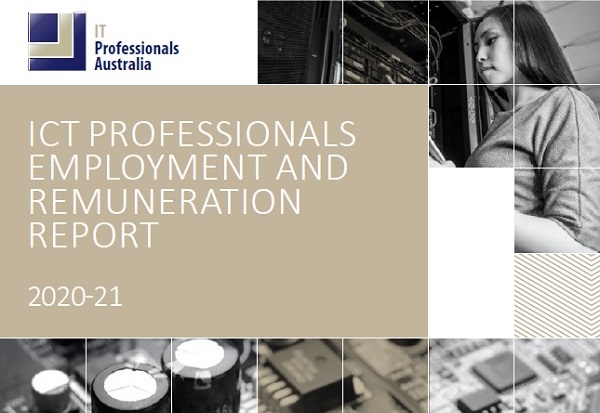REPORTS
ICT Professionals Employment and Renumeration Report 2020-21
FOREWORD
The COVID-19 pandemic will continue to have a major impact on the IT labour market in the next 12 months and beyond. However the speed of social and economic recovery, the magnitude of the changes and the extended outlook for particular industries, skill sets and labour market segments are difficult to forecast at this stage. As the McKinsey report “Global health and crisis response” highlights “We have never before attempted to shut down the modern global economy, much less reopen it in the setting of an ongoing pandemic.”
One thing that is clear from the COVID-19 pandemic however is how critical ICT professionals are to contemporary workplaces, industries and the economy, enabling us to quickly adapt in a crisis and operate effectively in the short and long term.
ICT professionals should be more formally acknowledged for the crucial role they have played in developing innovative ICT solutions, which have allowed many public services, industry sectors and employees to continue working remotely through the pandemic.
The impact of the pandemic on the employment of ICT workers has been variable across sectors. Since the COVID-19 crisis unfolded, tech job losses have mainly affected the travel and retail industries. Although the 2020 Deloitte report on Australia’s Digital Pulse estimated a reduction of around 35,000 in the Australian IT workforce between March and December 2020, it also forecast significant growth by 2025, projecting a workforce of around 928,700.
ICT professionals have not been immune from the negative effects of the COVID-19 pandemic. Around one in ten of our ICT survey respondents reported receiving JobKeeper (the Commonwealth subsidy to encourage business to retain staff during the pandemic) and 18 per cent were asked to use their annual leave.
While the timing and scale of the economic recovery remains uncertain, it appears hiring intentions for ICT professionals will remain strong in several areas. Specialists in AI, machine learning, mobile app development, web development, advanced data analytics, cybersecurity and transitioning to the Cloud remain in high demand across Australia.
Employers who continue to invest in digital transformation look set to recover more quickly and effectively than others. ICT professionals will be required to support the acceleration in online product and service delivery and remote working, and to strengthen cybersecurity, especially in critical infrastructure areas over the next 12 months.
Although many IT professionals will maintain current roles or take up opportunities in emerging areas, others could experience changes in their conditions, reduced hours of work, wage freezes and greater use of contract arrangements.
IT Professionals Australia will prioritise the safeguarding ICT jobs, pay and conditions, including working hours and health and safety. Wage growth for ICT professionals reported through our survey was disappointing at 1.4 per cent. While 28.8 per cent of our ICT survey respondents were dissatisfied with their current remuneration, 32.1 percent did not expect any wage growth for ICT workers over the next 12 months. Survey respondents also reported increased working hours and unpaid overtime and just over 22 per cent indicated that they experienced mental health issues during the pandemic.
One of the greatest concerns emerging from our survey this year was the negative workplace experiences reported by female ICT workers. While 76 per cent of survey respondents said that their organisation had policies in place to deal with discrimination, over 56 per cent of female respondents reported they had experienced discrimination on the basis of gender over the past three years, compared to just 2.8 per cent of males. In addition, over 20 per cent of female respondents reported sexual harassment, compared to 3.1 per cent of male respondents.
Discrimination and sexual harassment in the workplace are illegal and cause serious harm and damage to affected workers. While workplace policies are a necessary starting point, organisational leaders need to drive, model and embed a culture of respect across their organisations.
Professionals Australia will continue to advocate for gender equality and diversity across STEM and will take action to prevent and respond to discrimination and sexual harassment in workplaces where our members work.
Jill McCabe
CEO, Professionals Australia
SHARE:

About the Provider






